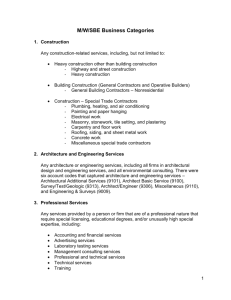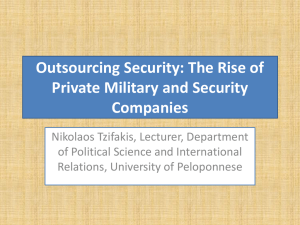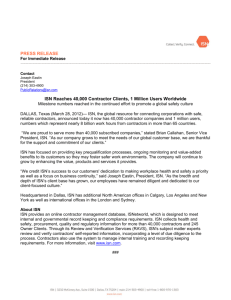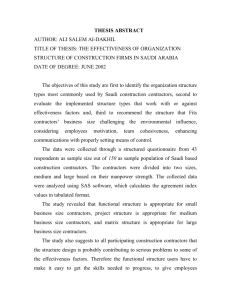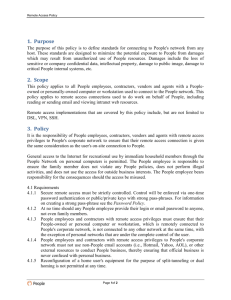I N T E R N A T I O...
advertisement
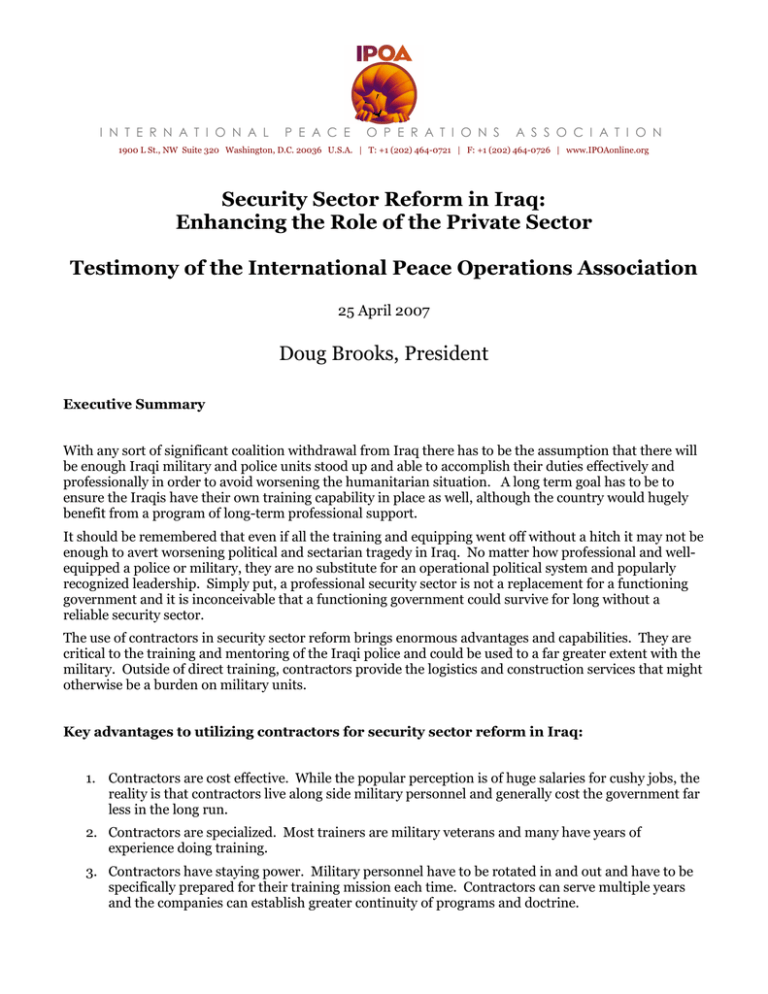
I N T E R N A T I O N A L P E A C E O P E R A T I O N S A S S O C I A T I O N 1900 L St., NW Suite 320 Washington, D.C. 20036 U.S.A. | T: +1 (202) 464-0721 | F: +1 (202) 464-0726 | www.IPOAonline.org Security Sector Reform in Iraq: Enhancing the Role of the Private Sector Testimony of the International Peace Operations Association 25 April 2007 Doug Brooks, President Executive Summary With any sort of significant coalition withdrawal from Iraq there has to be the assumption that there will be enough Iraqi military and police units stood up and able to accomplish their duties effectively and professionally in order to avoid worsening the humanitarian situation. A long term goal has to be to ensure the Iraqis have their own training capability in place as well, although the country would hugely benefit from a program of long-term professional support. It should be remembered that even if all the training and equipping went off without a hitch it may not be enough to avert worsening political and sectarian tragedy in Iraq. No matter how professional and wellequipped a police or military, they are no substitute for an operational political system and popularly recognized leadership. Simply put, a professional security sector is not a replacement for a functioning government and it is inconceivable that a functioning government could survive for long without a reliable security sector. The use of contractors in security sector reform brings enormous advantages and capabilities. They are critical to the training and mentoring of the Iraqi police and could be used to a far greater extent with the military. Outside of direct training, contractors provide the logistics and construction services that might otherwise be a burden on military units. Key advantages to utilizing contractors for security sector reform in Iraq: 1. Contractors are cost effective. While the popular perception is of huge salaries for cushy jobs, the reality is that contractors live along side military personnel and generally cost the government far less in the long run. 2. Contractors are specialized. Most trainers are military veterans and many have years of experience doing training. 3. Contractors have staying power. Military personnel have to be rotated in and out and have to be specifically prepared for their training mission each time. Contractors can serve multiple years and the companies can establish greater continuity of programs and doctrine. I N T E R N A T I O N A L P E A C E O P E R A T I O N S A S S O C I A T I O N 4. Companies are accountable. Contracts can be and are sometimes modified, penalized or cancelled based on performance and changing conditions. Companies must answer to government Contract Officers providing guidance and oversight. Contractors must obtain government licenses to do military or police training. 5. Contractors themselves can be held accountable. The Military Extraterritorial Jurisdiction Act (MEJA) allows the U.S. government to try individuals in Federal courts for felonies. This law has been on the books for several years but the Department of Justice is only now beginning to exercise it appropriately in Iraq. 6. Contractors are expandable. Companies are able to tap into huge pools of expertise and most companies have databases of thousands of individuals with a full array of skills, expertise, experience, languages and capabilities, which can be brought to bear in support of policies. 7. Contractors are resilient. Contractors are skillful risk managers, and claims that the private sector cannot operate in dangerous environments have been overwhelmingly dispelled. 8. The use of contractors enhances military readiness. The U.S. military is keen to ensure its units are not overstretched nor side tracked from their primary missions due to training and noncritical requirements and assignments. Contractors tap into the huge pool of experienced military veterans to take the burden off the core active units. Key areas for improvement in utilizing contractors for security sector reform in Iraq: 1. To maximize value both the Department of State and Department of Defense must improve oversight capacities and capabilities in general. This is a common refrain, and one that the industry strongly supports. Good oversight benefits both companies as well as clients. 2. Contracts in complex contingency operations need to be flexible. Too often contracts are modified significantly while already in force, creating problems, additional costs and delays for companies and client. 3. Companies often complain of a lack of continuity in oversight. Handoffs between Contract Officers and their successors can be irregular, problematic and disruptive. 4. Contract coordination between government departments needs to be improved. Companies are concerned that DoD Contract Officers and DoS Contract Officers do not communicate enough nor do they operate with the same rules, creating costs and complications which have negatively impacted performance. 5. Quality matters. Too much emphasis is placed on contract price when better quality companies are more effective at achieving policy objectives. Contracts awarded with too much emphasis on price can reward marginal companies and undermine more experienced and professional firms. 6. Better coordination between government departments could reduce overlapping efforts by contractors and create greater efficiencies. 7. The means of law enforcement can be improved. Impartial investigations into allegations of corruption and abuse benefit the larger industry in the long run. Private companies are being contracted to serve government policies. There is no reason that we cannot demand that they live up to high professional and ethical standards. Allegations of impropriety, corruption and criminal behavior can and should be addressed contractually and legally. From an industry perspective, we fully support effective oversight and accountability. 2 I N T E R N A T I O N A L P E A C E O P E R A T I O N S A S S O C I A T I O N Security Sector Reform in Iraq: Enhancing the Role of the Private Sector Testimony of the International Peace Operations Association 25 April 2007 Doug Brooks, President I. Introduction Thank you for the opportunity to provide an industry perspective on the critical issues highlighted in this hearing. The role of the private sector is too little understood and too often treated with suspicion. The International Peace Operations Association is a nonprofit, nonpartisan, nongovernmental association of services companies providing critical services to stability and peace operations worldwide. With more than thirty member companies providing services including training, logistics, security, aviation, mine action, and medical support we represent a demand-driven industry providing cost effective services in some of the most dangerous environments imaginable. This testimony will provide some background information and explain why governments utilize these companies and how they can best be smart clients. The leadership, initiative, and oversight of the training effort must come from the governments of the United States and Iraq. While some of the actual training can be done by U.S. military and government employees, we should be clear that a significant portion of the expertise, resources and hundreds of experienced long-term personnel doing the hands-on training and mentoring are necessarily going to come from the private sector. Contractors are providing extraordinary expertise, resources and capacity to the training and support of the Iraqi police and military. This is a concept where an effective publicprivate partnership is simply indispensible. Indeed, it is inconceivable that success could be achieved any other way. Not surprisingly there have been innumerable political and operational problems and conflict related setbacks to the training programs, as well as frequent attacks targeting the Iraqi trainees. Attempting reconstruction and redevelopment in the face of an ongoing conflict is necessarily difficult and nothing quite like the operation in Iraq has been attempted in the past. The closest parallel might be the Civil Operations and Revolutionary Development Support (CORDS) program in Vietnam, which did show a surprising degree of success in the face of constant attacks by the Vietcong – but only with an astonishing 3 I N T E R N A T I O N A L P E A C E O P E R A T I O N S A S S O C I A T I O N level of national commitment. And while there are a number of actions that can be taken to improve the training process, the ultimate success of Iraq depends on dramatic political improvements as well. Considering the popular and political mood in the United States supporting withdrawal from Iraq by U.S. forces, the training of the Iraqi military and police forces is a policy that cannot be allowed to fail. If we hope to prevent an unprecedented humanitarian catastrophe we need to make sure this public-private effort succeeds and the Iraqi population has an effective security network in place prior to major U.S. military withdrawal. The private sector has been very active and if called upon can increase its role even more. In the years since the 2003 intervention much has been done to increase and improve security sector training capacity. At the same time, much has been done to address contractual and oversight problems that are inevitable in any operation on this scale. We must not hamstring the process. It is imperative that we be able to tap into private sector’s expertise and resources to accomplish this mission. II. Contractor utilization and advantages in security sector training The primary contractor reform role is in police training and mentoring. Several hundred are involved in actual training, while others provide life-support, construction capabilities, security and other necessary capabilities. Contractors bring a great deal of cost effectiveness to their work, even when using relatively expensive U.S. citizens to do the training. While salaries may be higher for contractors than for the alternative of using trainers from the armed forces, in fact the government is paying only a single upfront cost and not the long-term benefit costs that military personnel require. A Department of Defense estimate suggested that it costs an average of $15,000 per month for every soldier operating in Iraq so the comparable costs are not as dramatic as portrayed by some. At the same time, contractors tap into the pool of military veterans who bring with them field experience and risk management capabilities critical for work in hazardous environments. Companies are able to select personnel with the appropriate skill sets, specializations, backgrounds and even language capabilities to ensure they have the right people for the right position. The military too often finds that due to various operational and bureaucratic constraints they must use personnel not especially suited to the kind of training required. 4 I N T E R N A T I O N A L P E A C E O P E R A T I O N S A S S O C I A T I O N Contractors are able to stay in the field indefinitely. Turnover is lower than similar military operations where units are rotated out on six to twelve month tours and individuals must constantly be reassigned to new positions in order for their careers to progress. The private sector’s ability to maintain core personnel from year to year to ensure a single doctrine applied by a single training entity enhances standardization and quality. Contractors are not given enough credit for their resilience to risk. While some critics of the private sector have predicted that contractors would withdraw due to the high risk inherent in Iraqi operations, in fact the industry has found the risk levels to be manageable and remarkably few companies have left as a result of the threat levels. Risk fluctuates, but to date contractors have shown amazing robustness in their performance. Companies are much more controllable and accountable than portrayed in the press. Contracts can be and are sometimes modified, penalized or cancelled based on performance and changing conditions. Companies must answer to government Contract Officers providing guidance and oversight and contractors must obtain government licenses to do military or police training. All government contractors must abide by the Federal Acquisition Regulations (FAR) and if they are working for the Department of Defense, they must also follow the Defense Federal Acquisition Regulations Supplement (DFARS). This is a process than can always be improved and enhanced, but it is important to keep in mind that additional rules and regulations can also add costs and more importantly, risk. Individual contractors themselves can be held accountable as well. The Military Extraterritorial Jurisdiction Act (MEJA) allows the U.S. government to try individuals of all nationalities (except host country nationals) in Federal courts for felonies. This law has been on the books for several years but the Department of Justice is only now beginning to exercise it appropriately. There have been changes made that may put contractors under the military’s Uniform Code of Military Justice (UCMJ). However the use of the UCMJ for civilians has been extremely controversial and is opposed by several human rights organizations. Similar rules have been struck down in the past by the Supreme Court as well. Nevertheless, effective accountability is good for the industry and IPOA has been consistent in support of enhancement. The private sector is fully expandable to address changing needs and requirements. Companies are able to tap into huge pools of expertise and most companies have databases of thousands of individuals with a full array or skills, expertise, experiences, languages and capabilities which can be brought to bear in 5 I N T E R N A T I O N A L P E A C E O P E R A T I O N S A S S O C I A T I O N support of policies. Contractors take a burden off the military and allow soldiers to focus on their core missions. As the situation in Iraq evolves we can be confident the role of the private sector will evolve as well. III. Improving Contracts Outsourcing has been hugely successful, and we do have the best-supported, best-supplied military in history. However, there have been some obvious and very public flaws that have arisen in the course of the conflict and there is a number of things that could be done to address the problems. In light of the number and value of contracts that have been utilized, the most obvious way to maximize value would be for both the Department of State and Department of Defense to improve oversight capacities and capabilities in general. The quality of Contract Offices has varied significantly, a problem frequently cited by IPOA’s membership, although our member companies also emphasize that there has been a steady improvement. Improvement in oversight is something our industry strongly supports as good oversight benefits better companies as well as clients. Next, contracts for complex contingency operations need to have flexibility built in to take into account the inherently chaotic nature of conflicts. Too often contracts are modified significantly while already in force, creating problems, additional costs and delays for companies and clients. A frequent complaint from our member companies is about the lack of continuity in oversight. Handoffs between Contract Officers and their successors can be irregular, problematic and disruptive. This can be compounded when contracts are passed between government departments. Intragovernmental coordination could be vastly improved. Companies are concerned that DoD Contract Officers and DoS Contract Officers neither communicate enough nor do they operate with the same rules, creating costs and complications impacting on performance. Finally, there needs to be a recognition that quality matters, especially for contracts where so much is at stake. Too much emphasis is placed on competitive pricing when better quality companies are ultimately more effective at achieving policy objectives. Contracts awarded with too much emphasis on price can reward marginal companies and undermine more experienced and professional firms. Repairing problems or addressing delays made by cheaper contactors can also cost more resources in the long run. Companies that are members of IPOA would like to be recognized for adhering to a recognized industry code of conduct, something that is especially significant given the realities of conflict and post conflict 6 I N T E R N A T I O N A L P E A C E O P E R A T I O N S A S S O C I A T I O N environments. Ultimately, too much emphasis on price often simply offers a mirage of good value although the larger mission is not served well as a result. IV. Conclusions The U.S. effort in Iraq has been the best-supported, best-supplied military operation in history largely due to the innovative and creative utilization of private sector resources. There have been a number of well publicized problems and there will no doubt be more in the future. U.S. government leadership could be immensely useful in addressing the problems and ensuring that the invaluable capabilities the private sector brings to enhance national policies continue to be utilized to their fullest. Particularly with the Iraqi police, the use of contractors has enabled the training of tens of thousands of police without creating undue strain on military operations. The capacity that the private sector has brought to the challenge could not have been achieved in any other way without significant additional costs and strains on the larger U.S. effort in Iraq. Contractors reduce the burden on the military and could do more if these programs were expanded, especially regarding military training as has been done in the past. There are ways that the process could be improved and there is much that could be done to ensure better procurement, management, oversight and law enforcement. Good laws and good oversight are good for good companies. As a responsible trade association IPOA is happy to work with all branches of the U.S. government to proactively address the problems. Perfection in peace and stability operations remains a lofty goal, and laws and practices need constant refinements and improvements. We must remember that the private sector has been supporting U.S. military operations for literally centuries, and there is no doubt that we are going to utilize its capabilities in the future. It is critical that we use these companies in the best, most cost effective and efficient way while at the same time guaranteeing effective oversight and accountability. I look forward to answering your questions. 7

